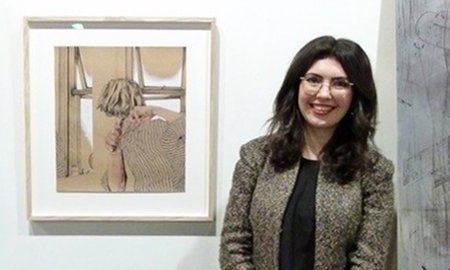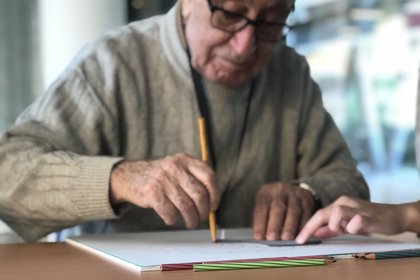
With 70,000 people living with dementia in Aotearoa New Zealand, and that number expecting to double every 20 years, finding ways to live well with a disease that cannot be prevented or cured has become a keen focus for Associate Professor Emma Febvre-Richards.
MinDArT is an art therapy project designed for people living with dementia and their supporters, and is one of three ongoing projects run by MeDArT. Ms Febvre-Richards says the programme has shown how drawing and engaging as many senses as possible can host a range of benefits for those living with dementia.
“MinDArT has shown drawing can increase wellbeing and self-esteem. We’re exploring how it can improve communication, both verbally and non-verbally, by offering another medium to express oneself that isn’t oral, alongside maintaining fine motor skills. It’s vital for people living with dementia and their supporters to have ways to improve the anxiety that comes with this disease and the day-to-day challenges it involves. We’ve been running the project in France and participants have shown a marked improvement in wellbeing and anxiety which is incredible to see, as you want to maintain living well for as long as possible with this condition.”
Different stages of the programme have been trialled in different locations, including France which was the first to complete data analysis revealing the positive results, but Te Whanganui-a-Tara Wellington was the first place to trial supporters and people living with dementia both taking part.
“The outcome of these sessions showed numerous benefits, not just for those living with dementia but for their supporters as well. They come in together but go into separate rooms, which helps improve the experience for both parties. By having separate groups, each get to have their own space to explore how they want to explore. It’s an eight-week programme with each session running for an hour and a half, and involves material and digital drawing exercises. At the end they get to come together and look at the artwork we’ve put up as a group mural that continues to grow each week,” Ms Febrve-Richards explains.
“What’s lovely is it provides equal ground. Often the people living with dementia are more experimental with drawings and do incredibly well. They get to leave feeling satisfied, as does their supporter, as they’ve both had this positive experience and get to leave together with something to talk about on the way home.”
The next stage of the programme is due to start at the end of September and involves a crossover trial which will investigate the impact of MinDArT compared to a Memory Café intervention. The study is looking for 72 participants or 36 pairs made up of someone living with dementia and their supporter.
Half of the participants will be randomly selected to participate in either MinDArT or a Memory Café for eight weeks, before entering a wash out period of ten weeks before switching programmes for a further eight weeks.
Ms Febrve-Richards says the aim for this stage of the project is to continue exploring the positive impacts MinDArT has and if these positive impacts persist over time, as well as if the improvements are greater than those engaging with a Memory Café (a social gathering that provides opportunity for connection at a selected venue).
“The point of doing a big study is to get data, and now with the next stage we’re looking to put a control group next to it to compare and expand on what we already know. Drawing is a different way of thinking in itself, and can play a crucial role in helping those with dementia live well. We want participants to experience how trusting the process with drawing, seeing where it takes them and just giving things a go will help benefit them in their wellbeing and their focus, as well as allow them some relaxation of just being in the moment.”
As an artist and someone who wanted to lean into her strengths to help others, Ms Febvre-Richards established MeDArT in 2018, as a collaborative research project between Te Kunenga ki Pūrehuroa Massey University and France’s Institut Claude Pompidou and Institut de Chimie de Nice of Universtié Côte d’Azur. She says she was at a stage in her life where she had the space to do more for others.
“When I started thinking about this project, I didn’t know anyone who was living with dementia. The idea really came from my artist’s point of view and wanting to give back. When I work with my students, I ask them what their strengths are. You do your best when you’re leaning into the things you are good at, and for me, I’m good with people and project management and art. However, since beginning this project, I know now of several people in my life living with dementia, which makes this project even more significant to me.”
Bringing together the research expertise of France and New Zealand, MeDArT consists of three projects – MinDArT, Draw me an Odour and Graphe - that focus on different methodologies which combine science, drawing and technology together to help advance dementia research and promote early diagnosis, autonomy and living well with dementia.
“It can be hard to get people committed in this area in terms of fundraising and awareness because it’s a condition connected with old age. We need to be valuing our older people and the wisdom and the experience and wonderful things they bring, but also the mahi that they’ve done,” Ms Febvre-Richards says.
If you know someone living with early stage dementia based in the Wellington area that may benefit from being involved in this project, check out the MinDArT website to learn more about how to get involved and sign up here. No prior experience with art or drawing is required.
A big thank you to Massey University Foundation, the Lindsay Foundation, New Zealand Community Trust, Dementia Wellington, and to all the generous individuals who have contributed their time and funds to this endeavour.
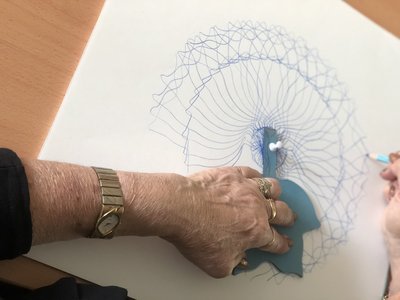
Related news
Research projects looking at the metaverse and dementia risk reduction among those awarded funding
Seven projects led by Massey researchers have secured funding from the Health Research Council.
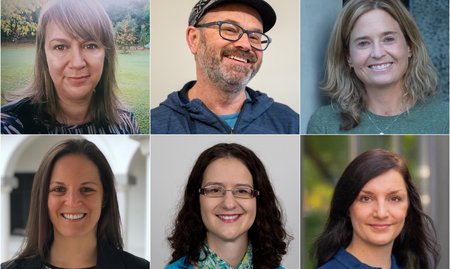
Study seeks to better understand terminal lucidity in children
Associate Professor Natasha Tassell-Matamua from the School of Psychology is working with an international team of experts to study terminal lucidity in children.
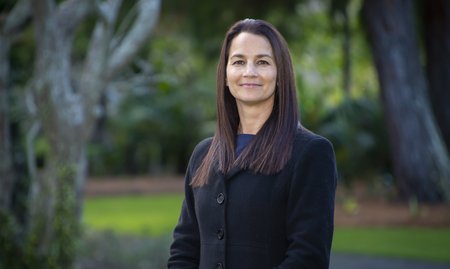
Graduate wins 2022 Parkin Drawing Prize
Bachelor of Fine Arts graduate Siân Stephens has been announced the winner of the 2022 Parkin Drawing Prize.
